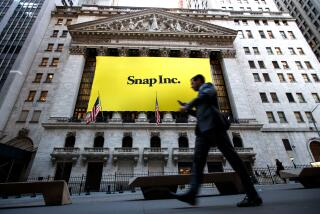How Snapchat’s costly acquisition of bitmoji-maker Bitstrips could pay off
- Share via
You as a cartoon? That’s what Bitstrips Inc.’s app does, slapping customized avatars onto comical sketches designed to be shared on social media.
The messages convey greetings, compliments, inside jokes and Internet memes. They’re the kind of bright, silly items that catch the eye when they pop up on Facebook or in text messages -- and they apparently captured the attention of Snapchat Inc. executives in Venice.
Though they may be a joke to users, the comics, known as bitmojis, are a big business opportunity for marketers yearning for any chance to be part of conversations happening on smartphone screens. That interest helps explain why Snapchat will spend a reported $100 million to purchase the seemingly trivial technology.
Bitstrips hasn’t said how many people use bitmojis, but young users have helped Bitstrips surge in popularity in the last year, according to app download charts. But the Toronto start-up won’t just help Snapchat remain in vogue with them. It would also bring Snapchat another creative advertising option -- and a way to spice up chats.
Users of Bitstrips customize an avatar of themselves. The digital drawing then appears in an ever-expanding library of sketches that convey messages like “good morning” or “happy birthday.” Users choose among the personalized comics and share them in chat and texting apps. The name “bitmoji” is a play on emojis, the smiley-faces and recognizable icons used in place of words in digital conversations.
News of the deal with Snapchat was first reported Thursday night by Fortune, and independently confirmed by a person familiar with it Thursday.
Snapchat declined to comment, so it’s unclear whether the popular chat app plans to integrate Bitstrips’ technology or maintain it as a separate app.
Either way, Snapchat, which relies on advertisers for most of its revenue, likely sees bitmojis as another unique way to sell sponsorships. Already, movies including “Inside Out” and “Batman v. Superman” have partnered with Bitstrips to pump out bitmoji sets that include the film’s characters.
“All the movies, all the television shows, all the fashion houses, all the pop stars, they all want to be bitmojis because we somehow became the determinant of who has made it,” Bitstrips Chief Executive Jacob Blackstock recently told Forbes, saying there’s an “incredibly lucrative business model” in there.
A Bistrips spokeswoman declined to say whether any companies have been charged for the special bitmoji packs.
Bitmojis essentially make users part of an ad, and that’s no different than what Snapchat already does. Features such as Snapchat Lenses animate selfies, placing movie characters and products in photos before they get sent to friends.
“The Snapchat advertising ecosystem puts the emphasis on creation of content -- geofilters, lenses and potentially branded bitmojis -- and even in their video [ads], they’re serving ads in content that they are encouraging users to create,” said Nick Cicero, chief executive of Snapchat-focused ad agency Delmondo. “Bitmoji could be another great piece in that creation toolkit for users.”
Advertising experts are still debating the value of such nontraditional ads, but there’s certainly high interest in reaching the young people who get excited about items such as bitmoji and lenses.
Bitmoji could fit into Snapchat in a few ways, most notably in the app’s core photo-and-video messaging functionality.
Snapchat already has easy ways for users to share their location. Geofilters, or small digital badges that users can affix to Snapchat images, usually explain where a person is by saying things like “Hollywood” or “Venice” in stylish fonts. Other overlays can show the time, the temperature or the score in a sports game at the moment a photo was taken.
Bitmojis could add a way to express how users feel when they aren’t taking a selfie. Snapchat allows people to place standard emojis on photos and videos, but bitmojis purport to do a better job of showing emotion because there’s a face -- albeit a cartoonish one -- attached. Snapchat could even generate revenue here, by charging users for special-edition bitmojis just as Bitstrips has done.
The bitmoji also could come into play in Snapchat’s text chat feature, which is tucked away behind the image-sharing elements. Snapchat is said to be working on a major overhaul of texting that would bring audio chat and more. It’s easy to see bitmojis being a part of that too, giving people a way to communicate visually without having to take photos themselves.
Consumer apps can fall out of favor overnight, which explains Bitstrips’ possible motivation to sell and exposes a risk for Snapchat.
For now, the numbers still look good. U.S. users spend nearly eight minutes using the Bitmoji iPhone app each month, according to mobile app intelligence firm Sensor Tower. That’s about 30 seconds more than users of MSQRD spend in the photo-editing app Facebook recently bought for an undisclosed sum. Almost 4% of users who downloaded Bitmoji this year continued to use the app a month later, better than MSQRD’s 2% retention.
“These numbers show that Bitmoji does a surprisingly great job at bringing users back into the app to update their avatars and engage with new content,” according to analysis from Sensor Tower.
The Bitstrips’ deal, which has been agreed to but not formally announced, wouldn’t be Snapchat’s first acquisition. Snapchat has used stock and some of the more than $1.3 billion it’s raised from investors to purchase or invest in a handful of companies, including Vergence Labs -- a start-up whose technology became the foundation for the Lenses feature.
Bitstrips raised $11 million in funding from investors including Horizons Ventures and Kleiner Perkins Caufield & Byers, which has invested in Snapchat as well.
UPDATES:
2:20 p.m.: Updated with data and comments from Sensor Tower.
The original version of this article was published at 11:59 a.m.







